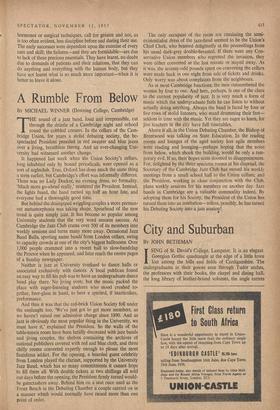A Rumble From Below
BY MICHAEL WINNER (Downing College, Cambridge) THE sound of a jazz band, loud and irrepressible, cut through the drizzle of a Cambridge night and echoed round the cobbled corners. In the cellars of the Cam- bridge Union, for years a stolid debating society, the be- spectacled President presided in red sweater and blue jeans over a jiving, breathless throng. And an ever-changing Uni- versity had witnessed another change.
It happened last week when the Union Society's cellars, long inhabited only by bound periodicals, were opened as a sort of nightclub. True, Oxford has done much the same thing a term earlier, but Cambridge's effort was informally different. There was no Lady Docker, no evening dress, no formality. 'Much more go-ahead really.' muttered the President. Instead, the lights fused, the band turned up half an hour late, and everyone had a thoroughly good time.
But behind the drainpiped wriggling couples a more perman- ent metamorphosis was taking shape. Spearhead of the new trend is quite simply jazz. It has become so popular among University students that the very word ensures success. At Cambridge the Jazz Club crams over 500 of its members into weekly sessions and turns many more away. Occasional Jazz Band Balls, sporting name bands from London cellars, swing to capacity crowds at one of the city's biggest ballrooms. Over 1,000 people crammed into a recent ball to slow-handclap the Proctor when he appeared, and later reach the centre pages of a Sunday newspaper.
Neither is jazz at University 'confined to dance halls or associated exclusively with dances. A local publican found an easy way to fill his pub was to have an undergraduate dance band play there. No jiving even; but the music packed the place with eager-listening students who stood crushed to- gether, beer-glass in hand, to hear a spirited, if inarticulate, performance.
And thus it was that the red-brick Union Society fell under the onslaught too. 'We've just got to get more members, as we haven't raised our admission charge since 1890. And as jazz is obviously the most popular thing in the University, we must have it,' explained the President. So the walls of the table-tennis room have been luridly decorated with jazz bands and jiving couples, the shelves containing the archives of national publishers covered with red and blue cloth, and three chilly rooms converted expertly enough to please the most fastidious addict. For the opening, a bearded guest celebrity from London played the clarinet, supported by the University Jazz Band, which has so many commitments it cannot hope to fill them all. With double tickets at two shillings all sold out days before the opening, the President firmly turned would- be gatecrashers away. Behind him on a seat once used as the Front Bench in the Debating Chamber a couple carried on in a manner which would normally have raised more than one point of order. The only occupant of the room not emulating the semi- existentialist dress of the jazz-fiend seemed to be the Union's Chief Clerk, who beamed delightedly at the proceedings from his usual dark-grey double-breasted. If there were any Con- servative Union members who regretted the invasion, they were either converted at the last minute or stayed away. As it was, the seventy-odd pounds spent on converting the cellars were made back in one night from sale of tickets and drinks. Only worry was about complaints from the neighbours.
As at most Cambridge functions, the men outnumbered the women by four to one. And here, perhaps, is one of the clues to the current popularity of jazz. It is very much a form of music which the undergraduate feels he can listen to without actually doing anything. Always the band is faced by four or five rows of stolid listeners, who stand drumming their feet— seldom in time with the music. Yet they are eager to learn, for jive teachers in the city have full timetables.
Above it all, in the Union Debating chamber, the Bishop of Brentwood was talking on State Education. In the reading rooms and lounges of the aged society less agile members were reading and lounging—perhaps hoping that the noise from below, which shook the building, would be only a tem- porary evil. if so, their hopes seem doomed to disappointment. For, delighted by the three spacious rooms at his disposal, the Secretary of the Cambridge Jazz Club has moved his weekly meetings from a small school hall to the Union cellars; and the President, working in close conjunction with the Club, plans weekly sessions for his members on another day. Jazz bands in Cambridge are a valuable commodity indeed. By adopting them for his Society, the President of the Union has turned them into an institution—unless, possibly, he has turned his Debating Society into a jam session !,


































 Previous page
Previous page